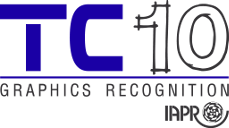Call for Papers
Deep Learning for Graphics Recognition: Document Understanding and Beyond
Graphics Recognition is the subfield of pattern recognition that deals with graphic entities. Graphical cues (including graphical languages) are often better to describe complex ideas than texts, and they are dynamic by nature. Besides, the recognition of graphical elements (e.g. graphical notations) in heterogeneous documents are useful to understand the contents and user intentions, or to identify the application domain.
In recent years, due to its ability of learning from big data and the superior representation and prediction performance, deep learning has gained great successes in various applications of pattern recognition and artificial intelligence, including character and text recognition, image segmentation, object detection and recognition. In some cases, some issues can even be considered as solved when using deep learning.
Unlike the conventional pattern recognition and machine-learning works, in this special issue, we focus on high-level deep learning architectures and/or models for graphics recognition problems. In pattern recognition issues, the convolutional neural network (CNN) and the recurrent neural network with long short-term memory (LSTM) have been applied successfully. The improvement of performance is effective with deep learning, when large sets of labeled data are available for supervised learning. How Graphic Recognition can benefit from Deep Learning? Can common deep learning models be used to tackle Graphic Recognition problems and improve document understanding?
This special issue is aimed to report the original and innovative advances in Graphics Recognition using deep learning methods. Thus, articles presenting reviews, perspectives, new methods and applications using deep learning for graphics recognition are cordially invited. The relevant topics of interest include (not limited to):
- Analysis and interpretation of graphical documents, such as engineering drawings, floorplans, mathematical expressions, comics, maps, music scores, patents, diagrams, flowcharts, tables, etc.;
- Recognition of handwritten or printed graphic elements (e.g. symbols, logos, stamps, drop caps) in heterogeneous documents (e.g. pointers and graphical notations in medical reports, forms, etc.);
- Graphics-based information retrieval;
- 3-D models from multiple 2-D views (line drawings);
- Sketch recognition and understanding;
- Graphics recognition in born digital documents;
- Analysis of graphics on new digital interfaces;
- Graphics detection and recognition in real scenes.
Important dates
Paper submission deadline: Feb 16, 2020
First review notification: Mai 10, 2020
Decision (final notification): July 10, 2020
Production (Springer, IJDAR): Sept, 2020
Submission guidelines
Manuscripts should be limited to 20 pages (two column, double spaced and inclusive of figures). Paper submissions must follow the format guidelines of IJDAR (instructions for authors). See: https://www.springer.com/computer/image+processing/journal/10032
Submissions to the special issue must include new, unpublished, original research. Papers must be original and have not been published or submitted elsewhere. If the submissions are extended works of previously published papers, the original works should be included and a description of the changes that have been made should be provided.
Prospective authors should submit an electronic copy of their complete manuscript through the Editorial Manager system at http://www.editorialmanager.com/IJDA. Manuscripts will be peer reviewed according to the standard of the International Journal on Document Analysis and Recognition.
Important note: Guest editors will make an initial determination of the suitability and scope of all submissions. Please note that the focus of this special issue is deep learning methods for graphics recognition, so submissions that do not fall within this scope will be rejected without review.
More information on the Graphics Recognition research topics at: https://iapr-tc10.univ-lr.fr/
For enquiries regarding the special issue, send an email to the managing guest editors (see below).
Guest editors
K.C. Santosh, University of South Dakota, USA (Santosh.KC(at)usd.edu)
Jean-Christophe Burie, La Rochelle Université, France (jcburie(at)univ-lr.fr )
Alicia Fornés, Universitat Autònoma de Barcelona, Spain (afornes(at)cvc.uab.es )
Muhammad Muzzamil Luqman, La Rochelle Université, France (mluqma01(at)univ-lr.fr)
